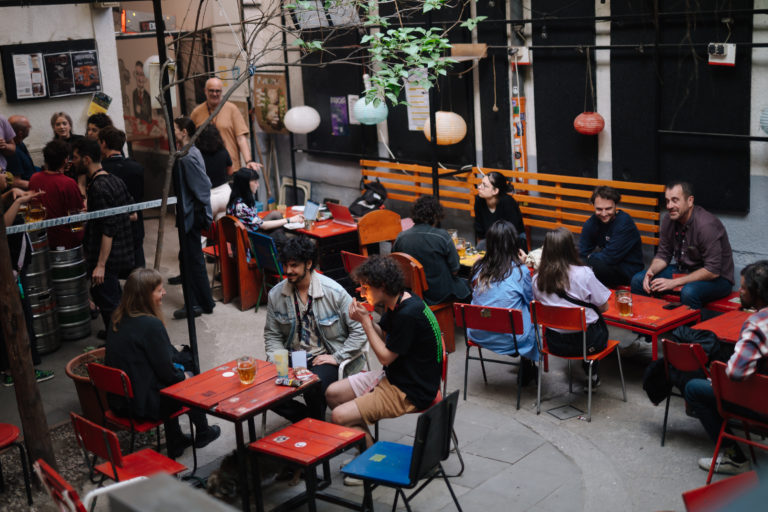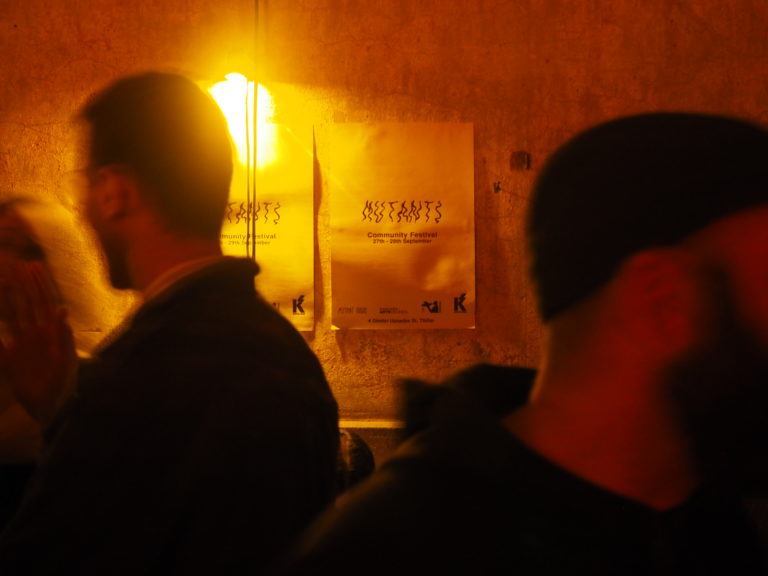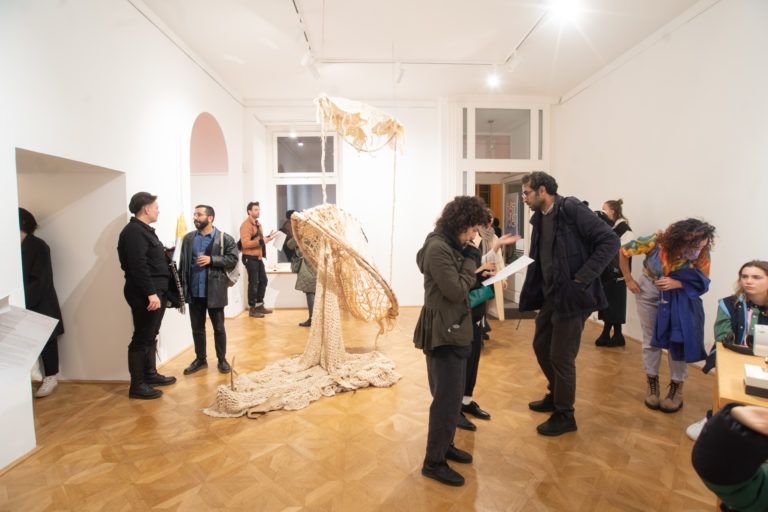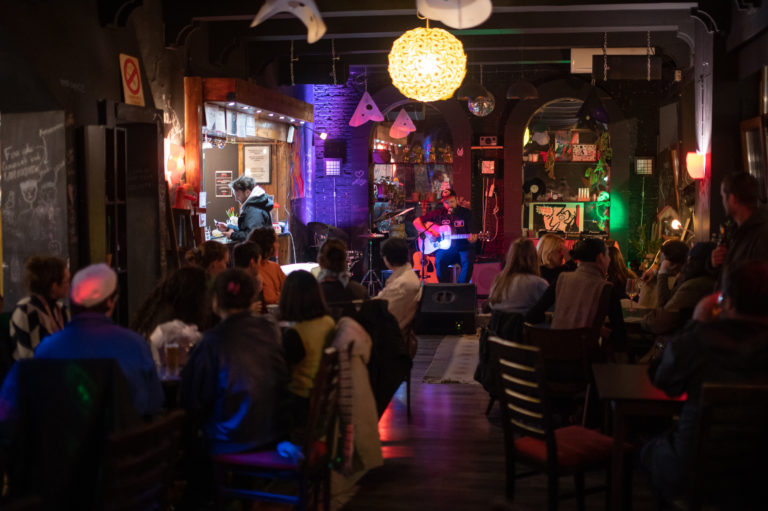Author: Smaranda Krings
Across Europe, independent cultural and media organisations are facing growing pressure from right-wing political forces intent on reshaping public discourse. While the erosion of freedoms often unfolds gradually—through funding cuts, leadership changes, and the quiet silencing of dissent—these slow-burning developments are anything but benign. Smaranda Krings calls for urgent transnational solidarity to confront these tipping points head-on, urging cultural workers to stand united before irreversible damage is done to the spaces that nurture open societies.

Auróra, Budapest (2024) — © Mate Kalicz
The independent culture and media sector across Europe regularly faces substantial threats. Right-wing politicians, who want to enforce a narrative of a homogeneous Europe, are strongly interested in co-opting this sector. The culture and media we consume shape our idea about the kind of society we want to live in. Controlling these areas of life lends legitimacy to major political decisions. I believe most liberal-minded individuals are aware, at least subconsciously, that the independent culture and media sector is under threat. They are aware of funding cuts, the gradual prohibition of certain speech, and the replacement of various department heads. However, as with many things in life, when change comes slowly but steadily, we tend to relativise it, and perhaps even overlook it. Therefore, it is increasingly important to identify where the tipping points are, and when we need to start acting.
Stifling Further Resistance
One obvious first tipping point could be the appointment of a Minister of Culture running their very own agenda. When this happened in Slovakia—with the appointment of Martina Šimkovičová in October 2023—, it paved the way for a myriad of decisions that have ultimately led to the dismantling of the country’s independent media and culture sector. Heads of state theatres were dismissed for engaging in ‘political activism,’ and institutions such as the Kunsthalle Bratislava were forced to close permanently. Without such institutions available as meeting spots and platforms for discussion, it becomes more difficult for the culture sector to resist. Former curators from these institutions either failed to find work in the cultural sector or moved countries. This makes effective resistance increasingly difficult.
Programmes, institutions, and university departments focusing on Diversity, Equity, and Inclusion are often the first to take the hit. Silencing already marginalised voices is often one of the first steps. Big protests are rare in these cases, and this effectively eliminates some of the most critical voices. Decentralised projects, such as community broadcasters, are usually denied funding early on since they enable the dissemination of a wide variety of opinions. Since Orbán took power in Hungary in 2010, the majority of the approximately 70 existing radio stations have ceased operations. By 2018, only 16 remained. But also funding streams for other endeavours start slowly disappearing. Often it is framed as a response to general budget cuts, though big institutions rarely have significant cuts whereas smaller citizen-run projects are often eliminated. The various ministry’s funding priorities also often influence the agenda of private foundations. They often redirect their focus on other topics, more aligned with the overall tendencies.

Mutant Festival, Tbilisi (2024) — © Laurent Bigarella
Active Citizenship as Collective Resistance
The most effective way to counter threats to the independent media and culture is to strengthen these structures to such an extent that they become impervious to external intimidation. A strong, unified sector is the best way to maintain the activity of all our structures. Standing in unity means regularly discussing the latest developments in other countries. As it can be overwhelming to try to stay informed about so many things at once, I suggest setting up a scheme of ‘partner organisations’. Each organisation located in a relatively liberal cultural environment should find a partner organisation in a country facing consistent threats, such as today’s Slovakia, Georgia, Italy, or Hungary—though this vague categorisation in “relatively liberal” and “threatened” is clearly subject to constant change and would need to be defined more in detail. Think of it as a twinning programme: these organisations would be in regular contact, monitoring developments in each other’s countries, and supporting each other. Whatever the current developments, they must be discussed. Organisations across Europe must speak out and voice their concerns so that no major decisions can be made without scrutiny. This also includes demanding justifications for actions being taken from all political bodies. Even if changes cannot be enforced, active citizenship is an important element of collective resistance. Ideally, independent culture and media organisations would create a collective insurance fund that all pay into and which can be accessed when individual organisations are threatened—inspired by unions.
Support Your Local Cultural Centre
Still, whatever we do as cultural workers and curators, the real power lies with the community that engages with our work. Many organisations threatened by authoritarian regimes have already realised that true independence and community-based organisation can only be achieved through building membership models. Organisations in open democracies could encourage their community members to additionally support an organisation in a country facing existential threats, in addition to their existing support. This could be linked to the concept of partner organisations mentioned above and take the form of dual membership. Active membership means shaping organisations in ways that bring value to individual community members. They need to be able to identify with a space or group, which is why members need to be encouraged to be open about their needs, to bring up the topics that interest them, and to explain how they think the organisation can support them and their community.

QMA Exhibition Approximating 2022, Vienna — © Xenia Snapiro
Standing Together for What Is Right
It is exhausting to constantly be aware of all the little threats that are cumulatively coming our way. Most of us work in the independent culture and media sector with the aim of building an open society. We didn’t sign up to constantly fend off attacks and defend our organisations. However, in many countries, this has unfortunately become a significant part of the day-to-day job. It can be easier, though, if we stand together and look out for each other. A well-connected scene enables us to advocate for what we believe in and support each other when things seem hopeless. Let us stand closer together and collectively fend off these attacks.
What happens next
You like the idea of partner organisations and dual memberships and want to make it happen? Write an email to manon@arty-farty.eu and express your interest. As soon as a significant number of organisations contact us, we’ll set up an online call with everyone interested and collectively decide on a feasible way to implement this twinning programme.

Laboratorium, Skopje (2025) — © Marko Marjanovic
SUPPORT INDEPENDENT CULTURE AND MEDIA AT RISK
Tbilisi, Georgia → Left Bank’s GoFundMe
Tbilisi, Georgia → DIACI Community’s compilation album Women Against the Oppressive Regime
Tbilisi, Georgia → OC Media’s membership programme and emergency fundraising
Bratislava, Slovakia → Otvorená Kultúra!’s donation platform
Kyiv, Ukraine → 20ft Radio’s donation platform
Prague, Czechia → Ankali’s donation platform
Lisbon, Portugal → Arroz Estúdios’s donation platform
Tallinn, Estonia → The Belarusian Council for Culture’s donation platform
London, UK → Black Artist Database’s Patreon
Leeds, UK → Come Play With Me’s PayPal
Warsaw, Poland → Fundacja Ziemniaki i’s donation platform
Babakale, Turkey → Garp sessions’s donation platform
Lisbon, Portugal → Gerador’s subscription platform
Bucharest, Romania → KAJET Journal’s prints
Budapest, Hungary → Lahmacun Radio’s donation platform
Europe → Lazy Women’s PayPal
Budapest, Hungary → MMN Mag’s donation platform
Vilnius, Lithuania → Radio Plato’s Patreon
Lisbon, Portugal → Rádio Quântica’s donation platform
London, UK → Sister Midnight’s membership platform
Sofia, Bulgaria → ВИЖ! Magazine (Vij)’s Patreon
If you want your independent organisation, or one that you already support to appear on this list, please contact Reset! at manon@arty-farty.eu
Published on July 1st, 2025
About the author:
Smaranda Krings is a Vienna-based cultural manager and curator with many years of experience at the intersection of art, music and social issues. She specialises in project design, management and production with a focus on sustainable community building. She is active in the project management of QMA, the expert pool of D - Arts, and works freelance in music management and as a curator for various projects.